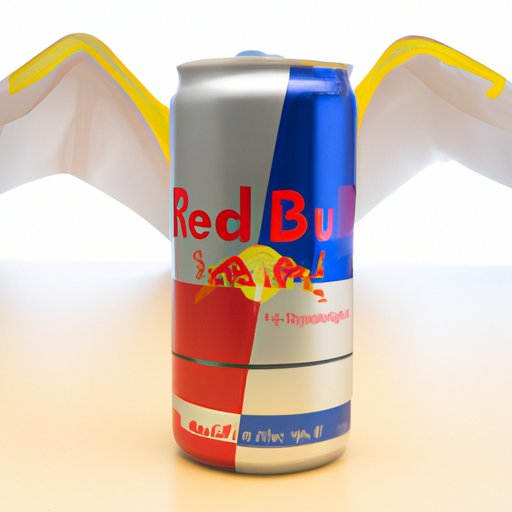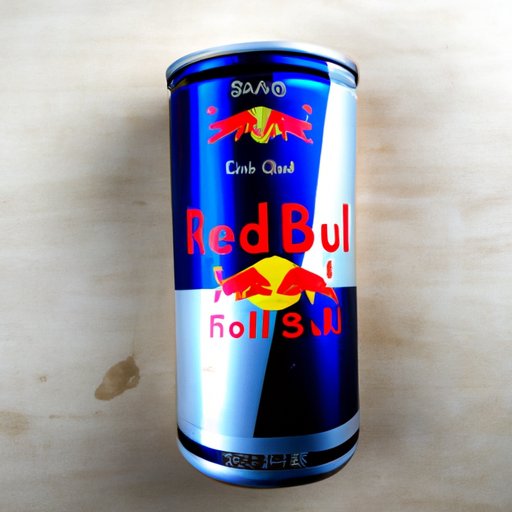Introduction
Red Bull, one of the world’s most popular energy drinks, has been around since 1987. In recent years, it has become increasingly popular among athletes, students, and those who need a boost of energy. But is Red Bull actually good for you? In this article, we’ll explore the potential health risks and benefits associated with consuming Red Bull.

Exploring the Health Risks of Red Bull Consumption
Red Bull contains several ingredients that can have adverse effects on health if consumed in large amounts. The two main ingredients of concern are caffeine and sugar.
Caffeine Content
A single 8.4 fl. oz. can of Red Bull contains 80 mg of caffeine, which is equivalent to the amount of caffeine found in an average cup of coffee. Although moderate caffeine intake (up to 400 mg per day) is generally considered safe, excessive consumption can cause side effects including headaches, anxiety, insomnia, and increased heart rate.
Sugar Content
Red Bull also contains a significant amount of sugar – about 27 g per 8.4 fl. oz. can. Excessive sugar intake can lead to weight gain, diabetes, and an increased risk of cavities and tooth decay. Too much sugar can also lead to an energy crash shortly after drinking the beverage.
Side Effects and Potential Risks Associated with Consumption
In addition to the side effects of caffeine and sugar, there are other potential risks associated with drinking Red Bull. According to Dr. Robert Glatter, an emergency physician at Lenox Hill Hospital in New York City, “High levels of taurine and caffeine in energy drinks can lead to cardiac arrhythmias, palpitations, and even seizures.” He also warns that mixing alcohol with Red Bull can be especially dangerous, as it can mask the effects of intoxication and lead to dangerous levels of alcohol consumption.
Examining the Nutritional Benefits and Downsides of Red Bull
In addition to the potential health risks associated with drinking Red Bull, there are also some potential benefits. Let’s take a closer look at some of the key ingredients in Red Bull.
Vitamin B Content
Red Bull contains a variety of B vitamins, including niacin, pantothenic acid, vitamin B6, and vitamin B12. These vitamins play an important role in energy metabolism and can help to reduce fatigue and improve mental alertness.
Taurine
Taurine is an amino acid that plays a role in cardiovascular health and can help to regulate blood pressure. It is also believed to have antioxidant properties that can help to protect cells from damage caused by free radicals.
Glucuronolactone
Glucuronolactone is a naturally occurring sugar found in many plants and fruits. It is believed to have detoxifying and energizing effects, although there is limited evidence to support these claims.
Do the Caffeine and Sugar in Red Bull Make it Unhealthy?
Given the high levels of caffeine and sugar in Red Bull, some people may question whether it is healthy to drink. To answer this question, let’s compare Red Bull to two common beverages: coffee and soft drinks.
Comparing Red Bull to Coffee
The caffeine content in Red Bull is similar to that of coffee, but coffee does not contain any sugar. Therefore, if you’re looking for a caffeine boost without all of the added sugar, coffee may be a better option.
Comparing Red Bull to Soft Drinks
Soft drinks typically contain more sugar than Red Bull – up to 39 g per 12 fl. oz. can – and no caffeine. Therefore, if you’re looking for an energy boost without all of the added sugar, Red Bull may be a better option.

The Pros and Cons of Drinking Red Bull
Now that we’ve explored the potential health risks and benefits of drinking Red Bull, let’s take a look at the pros and cons of consuming this popular energy drink.
Pros: Boosts Energy and Alertness
The combination of caffeine, B vitamins, and other ingredients in Red Bull can help to increase energy levels and mental alertness. This can be beneficial for athletes, students, and anyone else who needs an extra boost of energy.
Cons: Can Lead to Unhealthy Habits
Although Red Bull can provide a quick burst of energy, it should not be relied upon as a regular source of energy. Regular consumption of Red Bull can lead to unhealthy habits such as relying on caffeine to stay awake, and can also lead to dependency and tolerance.
Is Red Bull as Dangerous as People Claim?
Despite the potential health risks associated with drinking Red Bull, there is still debate over how dangerous it really is. Let’s take a look at some research studies and expert opinions to get a better understanding of the risks associated with consuming Red Bull.
Research Studies
A 2015 study published in the journal Drug and Alcohol Dependence found that drinking Red Bull can lead to increased risk-taking behavior. However, the authors of the study noted that further research is needed to determine the long-term effects of Red Bull consumption.
Expert Opinions
Dr. David Katz, director of the Yale University Prevention Research Center, believes that Red Bull is “not necessarily dangerous, but probably not necessary either.” He suggests that people should avoid drinking it regularly, and opt for healthier alternatives such as water or green tea.
How Much Red Bull is Too Much?
Given the potential health risks associated with drinking Red Bull, it is important to consume it in moderation. Here are some guidelines for recommended consumption and signs of overconsumption.
Recommended Consumption Guidelines
The American Beverage Association recommends limiting caffeine intake to no more than 400 mg per day, or about four 8.4 fl. oz. cans of Red Bull. They also recommend avoiding mixing Red Bull with alcohol.
Signs of Overconsumption
Signs of overconsumption include headaches, difficulty sleeping, increased heart rate, jitteriness, and nausea. If you experience any of these symptoms after drinking Red Bull, it is best to stop consuming it and seek medical advice.
Comparing Red Bull to Other Energy Drinks: Which is Healthier?
When it comes to choosing an energy drink, there are a variety of options available. Let’s take a look at some of the key differences between Red Bull and some of the other popular energy drinks.
Ingredients
Most energy drinks contain a combination of caffeine, B vitamins, and other stimulants. However, some brands contain additional ingredients such as guarana, ginseng, and taurine.
Caffeine Content
The amount of caffeine in energy drinks varies significantly from brand to brand. Red Bull contains 80 mg of caffeine per 8.4 fl. oz. can, while other brands may contain anywhere from 50 mg to 200 mg per serving.
Nutritional Value
It is important to read the nutrition label of any energy drink before consuming it. Some brands contain high amounts of sugar and calories, while others contain fewer calories and are sweetened with artificial sweeteners.
Conclusion
Red Bull can provide a boost of energy when needed, but it is important to consume it in moderation. While the caffeine and sugar content in Red Bull can be beneficial in small amounts, excessive consumption can lead to adverse health effects. When compared to other energy drinks, Red Bull is relatively low in sugar and calories, but the amount of caffeine can vary significantly from brand to brand. Ultimately, it is important to be aware of the potential health risks associated with drinking Red Bull and to make informed decisions when it comes to your health.
(Note: Is this article not meeting your expectations? Do you have knowledge or insights to share? Unlock new opportunities and expand your reach by joining our authors team. Click Registration to join us and share your expertise with our readers.)
